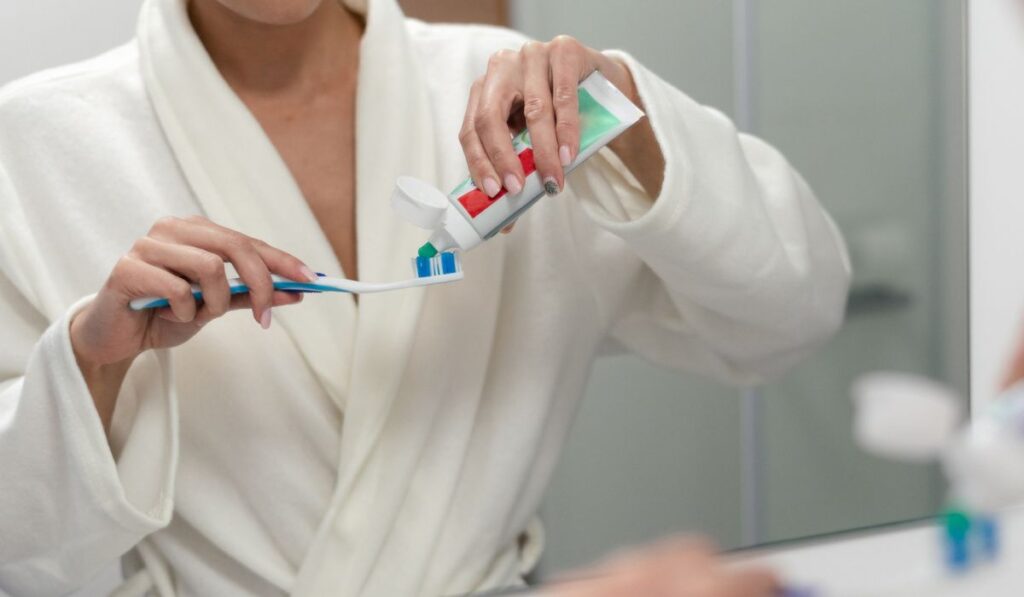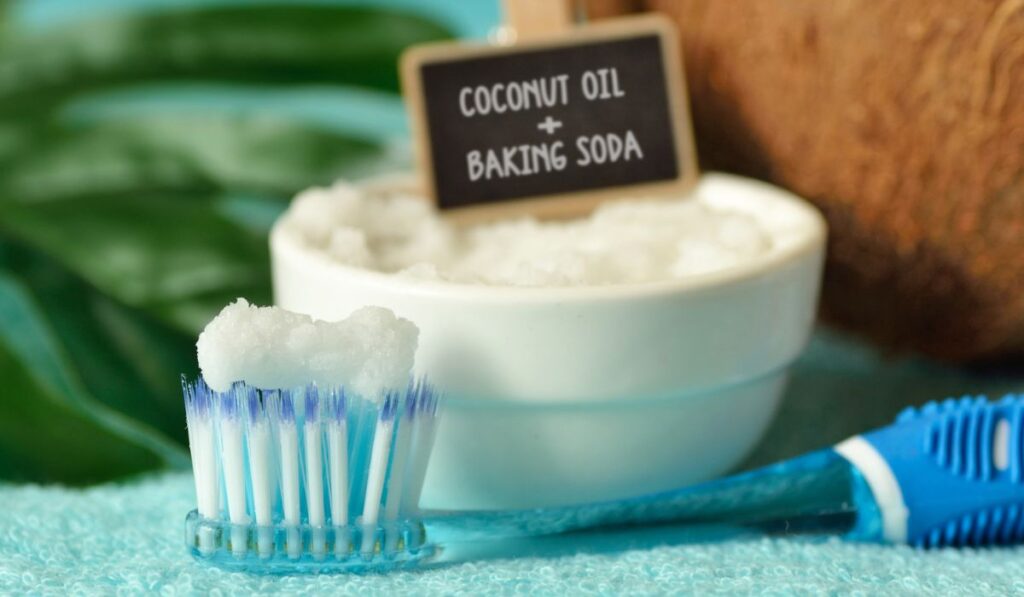If you’ve spent your entire life brushing with toothpaste, it may come as a surprise to learn that some people don’t use it all. The question you might ask at this point is, is toothpaste necessary for good oral hygiene? While many people understand the benefits of brushing teeth twice a day, they may not appreciate the benefits of using toothpaste.
Brushing your teeth with toothpaste is beneficial because it contains ingredients like fluoride, which helps teeth resist decay and makes them harder through a process called remineralization. However, you can substitute toothpaste with alternatives like baking soda, salt, or coconut oil.
While these alternatives will get the job of cleaning your teeth done, you do miss out on the benefits of ingredients like fluoride. So, if you’re tempted to drop the use of toothpaste, it’s important to understand why it’s typically considered essential to oral hygiene.
Do I Have to Use Toothpaste?

Plaque is the main cause of gum disease and cavity. If you don’t consistently remove plaque, it hardens onto the teeth and forms tartar, which nurtures an environment conducive for bacteria to grow. So, the best way to prevent tooth decay is to brush your teeth every day. But, how important is toothpaste to maintaining good oral hygiene?
From a practical standpoint, toothpaste is not always necessary to clean the teeth. You can use a soft-bristled brush and ensure proper brushing technique. This is enough to remove plaque from the teeth, which effectively prevents tooth decay.
When you combine regular brushing with flossing and limit the consumption of sugary drinks and foods, you might not need toothpaste, as your teeth will be clean and healthy.
So, why do you need toothpaste if you can achieve all these benefits without it? The reason is that toothpaste offers benefits you would not get if you brush without it.
It does not just help in cleaning your teeth. It prevents gingivitis, which can cause severe dental issues.
Here are some of the reasons you might want to continue using toothpaste:
- Most toothpaste brands contain fluoride, an ingredient that dental professionals agree helps to protect against cavities, keeping the tooth enamel strong.
- Toothpaste is available in different flavors, which helps leave your mouth and breath feeling fresh. Also, it can mask the strong scents of foods like onions and garlic.
- Toothpaste contains ingredients with properties that help with other dental problems, including tooth sensitivity, tooth decay, teeth whitening, and gum disease. The abrasives in toothpaste gently polish the teeth and remove the bacterial film. Abrasives also dissolve stains, restoring the clear natural look of your teeth.
With this comparison, you can see you could avoid using toothpaste, but for the best results, finding a good toothpaste brand will be a brilliant idea.
Where Did Toothpaste Come From?
If you use toothpaste every day, you probably never thought about how it was invented. Unlike what many people would think, toothpaste is not an invention of recent times.
Egyptians were the first to use toothpaste around 3,000 to 5,000 BC. They developed a dental cream that contained ashes from eggshells, an ox, myrrh, and pumice, and this helped to remove debris from teeth. Later, they added water to the powder whenever they wanted to brush their teeth.
About 1,000 years later, the Romans and Greeks introduced more abrasives to the mixture. These included oyster shells and crushed bones. Also, Romans are among the first to include flavors in their toothpaste, which helped with bad breath and made the toothpaste more edible.
Around this time, India and China also used a paste/powder with flavorings like herbal mints, ginseng, and salt, which made their product resemble the toothpaste used today. The common problem with ancient toothpaste was the excessive amount of abrasives, high cost, and poor taste.
In 1914, there was an important breakthrough, as fluoride was introduced into the history of toothpaste. As improvements were made, the American Dental Association approved the addition of fluoride salts in 1960.
This opened doors to the roll-out of toothpaste with fluoride as a key ingredient. Besides just cleaning teeth, toothpaste is now a multitasker as it contains active ingredients that combat different oral conditions and diseases, while also providing cosmetic benefits.
Alternatives to Toothpaste

When it comes to cleaning your teeth, you can use conventional toothpaste brands or go for alternatives. One of the reasons you would want to use alternatives is to avoid the chemicals contained in most toothpaste brands, like fluoride and sodium lauryl sulfate.
Often, traditional toothpaste contains ingredients like sodium lauryl sulfate, glycerin, and artificial sweeteners, which can pose a problem if you want something that is keto-friendly or vegan-friendly, for example.
So, here are some safe alternatives you can explore to keep your teeth sparkling clean:
Baking Soda
Baking soda (on Amazon) is the most common alternative to toothpaste, as it’s effective for cleaning your teeth while also preventing bad breath. It’s easy to prepare, as you only need to scoop out a little and mix it into water. Dip your toothbrush into the mixture and brush like normal. Also, you can add drops of mint oil to get that minty freshness.
Sea Salt
Like baking soda, you can use sea salt to clean your teeth. Dab the toothbrush in the salt and brush as normal. Keep in mind that although saltwater rinses have useful applications in dental care, salt is highly abrasive. If you plan on incorporating salt into your oral hygiene routine, talk to a dentist first.
Tooth Powders
It might sound somewhat hippy, but tooth powders, like Christopher’s Original Formulas (on Amazon) are another alternative to toothpaste. The Christopher’s herbal blend includes shavegrass herb, peppermint leaf, and white oak bark.
Hydrogen Peroxide
Hydrogen peroxide is known for its tooth whitening properties, and some people prefer hydrogen peroxide to toothpaste. Be careful to use equal parts hydrogen peroxide and water. However, do not use hydrogen peroxide at all for cleaning or whitening if you have amalgam fillings! Doing so extracts poisonous vapors from the mercury in a silver filling.
Coconut Oil
Coconut oil can work miracles on your skin and hair, but it’s also a good option for cleaning your mouth. It offers antibacterial and anti-fungal properties. Also, it can be combined with baking soda, making it a powerful option for cleaning teeth.
Best All Natural Toothpaste Brands
Natural toothpaste brands contain ingredients that not only clean your teeth, but also allow you to do so without exposing yourself to certain chemicals. These are some of the best brands you can find if you want all-natural toothpaste.
Dr. Bronner’s All-One Peppermint Toothpaste
Dr. Bronner’s toothpaste (on Amazon) features a 70 percent organic formula. It’s a peppermint-flavored toothpaste that is free of artificial flavors, fluoride, synthetic foaming agents, and sweeteners.
Burt’s Bees Purely White Toothpaste
Burt’s Bees Purely White toothpaste (on Amazon) is made without fluoride, sodium lauryl sulfate (SLS), triclosan, and parabens. It uses hydrated silica derived from sand to remove surface stains on the teeth.
JĀSÖN Powersmile Anti-Cavity & Whitening Gel
JASON Powersmile (on Amazon) works using what the brand calls “natural polishers” like baking soda and bamboo powder. Its gel is made without any fluoride, sodium lauryl sulfate, gluten, or artificial sweeteners.
Can I Brush My Teeth Just With Water?
Because it’s determined you could brush your teeth without toothpaste, one question you might be asking is whether brushing with just water is enough. One of the things toothpaste does is provide lubrication when brushing.
This prevents damage to your gums. While you could use water to clean your teeth, the bristles could scratch your gums or damage your enamel.
In addition, your toothpaste contains abrasives, which help with the cleaning process. There are whitening agents, which are chemicals that help your teeth achieve that white, clean look.
Although the whitening agents are not as effective as a whitening treatment, they help to lessen the effect of staining on the teeth. Used over a long period, toothpaste will help you maintain a beautiful smile.
Another reason brushing without toothpaste may not be a good idea is that most toothpaste brands offer different flavors. You get minty freshness, which makes the mouth smell good. Good breath is a reason enough to convince one to use toothpaste, as you expect to have fresh breath when you brush your teeth.
Another reason you should not use just water to brush your teeth is that using toothpaste balances the pH of the mouth. An acidic pH of your saliva makes it easy for tooth decay to happen.
Toothpaste contains sodium phosphate, which lowers the pH of the oral cavity. Besides, toothpaste contains potassium nitrate, which helps you to fight tooth sensitivity.
Conclusion
While you can clean your teeth without toothpaste, most toothpaste brands offer ingredients that offer more than just cleaning. They help keep your teeth white and also ensure fresh breath. However, you can also use natural alternatives if you’re concerned about certain ingredients in some toothpaste brands.


